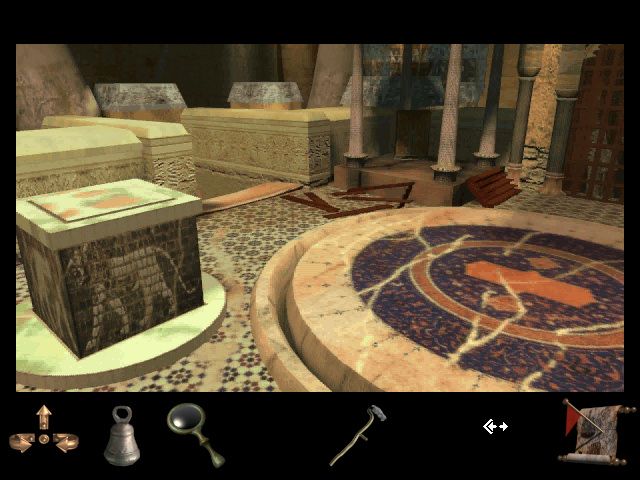Retro Replay Review
Gameplay
Reah: Face the Unknown places you squarely in the shoes of an ambitious journalist whose pursuit of fame quickly becomes a fight for survival. From the moment you step through the malfunctioning teleportation gateway, you’re confronted with layered challenges that go far beyond simple exploration. The core gameplay loop revolves around environmental puzzles that demand careful observation, logical reasoning, and often, a little trial and error. With over a hundred puzzles to tackle, the game strikes a careful balance between accessible brainteasers and genuinely hair-pulling conundrums, ensuring both casual adventurers and hardcore puzzle fans stay on their toes.
(HEY YOU!! We hope you enjoy! We try not to run ads. So basically, this is a very expensive hobby running this site. Please consider joining us for updates, forums, and more. Network w/ us to make some cash or friends while retro gaming, and you can win some free retro games for posting. Okay, carry on 👍)
The first-person perspective intensifies the immersion, forcing you to rely on your own senses as you comb through the abandoned research center and the alien city beyond. Inventory management also plays a key role—combining strange artifacts with human‐made tools often yields surprising new pathways. While some puzzles feel delightfully inventive—such as deciphering alien scripts to activate long-dormant machinery—others can border on obscure, requiring frequent note-taking or backtracking to earlier areas. This complexity can be a double-edged sword: it’s deeply rewarding to crack a particularly fiendish puzzle, but there are moments when progress grinds nearly to a halt.
Replay value is modest but present. Once you understand the logic system behind the alien technology, subsequent playthroughs become smoother. However, the linear narrative and one-way path through most puzzles limit true non‐linear exploration. Still, for players who revel in methodical puzzle-solving and atmospheric first-person adventures, Reah offers a satisfying, play-at-your-own pace experience that rarely feels repetitive despite its high puzzle count.
Graphics
Originally released on six CDs, Reah’s graphics were modest by late-90s standards, featuring pre-rendered backgrounds with static camera angles. Textures can appear grainy, and character models are blocky compared to modern titles. Yet the developers’ focus on mood—using shadowed corridors, flickering lights, and unsettling architecture—often eclipses raw fidelity. Even on the lower-quality CD release, the game’s art direction crafts an eerie, otherworldly atmosphere that holds up surprisingly well.
The double-sided DVD version, however, is where Reah truly shines. By consolidating ten CDs’ worth of assets onto a single DVD, the game benefits from higher‐resolution textures, smoother animations, and more detailed cutscenes. Colors are richer, and the distant cityscapes acquire an almost tangible depth. On capable hardware, the DVD edition removes many of the jagged edges and low-res artifacts, making the alien environment feel vivid and immersive. If you have the choice, this version is the clear recommendation for anyone wanting Reah in its best light.
Cutscenes and scripted sequences retain a certain charm, even if they’re no longer cutting-edge. Voice acting is serviceable, though delivery can veer between earnest and melodramatic. In combination with the ambient score—haunting drones and sudden stings of synthesized sound—the visuals work in concert to draw you deeper into Reah’s mysterious world. Whether you play the CD or DVD release, the game’s graphics succeed in establishing a tone of isolation and unease that few adventure titles of its era match.
Story
The narrative of Reah: Face the Unknown starts with a simple premise: investigate a malfunctioning teleportation gateway that links Earth’s isolated research base on planet Reah to a bizarre, alien realm. You play the journalist eager for a scoop, only to have ambition turn into desperation when the connection collapses. Stranded in a deserted city, you’re left to piece together what happened to the scientists while wrestling with your own motives. This setup brilliantly ties your personal greed and professional curiosity into a broader mystery about the fate of an entire research team.
As you explore derelict laboratories, cryptic monoliths, and winding streets of a civilization lost to time, fragments of log files and audio diaries slowly reveal the consequences of tampering with forces beyond human comprehension. The story threads drip-feed information, encouraging players to hunt down each hidden data fragment. This approach deepens the sense of discovery but also means narrative payoff can be sparse until you’ve nearly completed the final puzzles. Patience is rewarded with a finale that ties together the artifact’s true purpose, the dangers of unchecked scientific hubris, and the very real threat of being forever lost between dimensions.
While some plot points lean on familiar sci-fi tropes—mad science, alien ruins, collapsing gateways—the compelling atmosphere and personal stakes elevate them. The game avoids overwhelming exposition, trusting players to connect the dots. Though the dialogue occasionally feels dated, it still conveys enough tension and intrigue to keep you invested. In the end, Reah’s story is less about cosmic revelations and more about human ambition, regret, and the cost of curiosity—a theme that resonates long after the credits roll.
Overall Experience
Reah: Face the Unknown stands as a testament to immersive puzzle-driven adventure games of the late 1990s. Its blend of first-person exploration, intricate environmental puzzles, and haunting atmosphere offers a unique experience that modern titles seldom replicate. While the game’s technical aspects show their age—especially in the six-CD version—the core design remains compelling. If you relish slow-burn mysteries that reward careful thought and attention to detail, Reah will hold your interest for hours on end.
The choice between the CD and DVD editions is crucial. The DVD’s enhanced graphics and smoother performance make it the preferred option for most players, but even the lower-res version delivers the same core gameplay and story. Be prepared for occasional frustration: some puzzles demand extensive note-taking and trial runs, and the lack of a hint system can leave you stuck. Yet overcoming those obstacles brings a genuine sense of accomplishment that few adventure games can match.
Ultimately, Reah: Face the Unknown is an elegant relic of its era—a game that prioritizes atmosphere and brain-teasing challenges over action and spectacle. Its narrative of ambition gone awry, set against the backdrop of an alien world, remains engaging. Whether you’re a long-time fan revisiting its corridors or a newcomer seeking a classic adventure, Reah delivers a deep, rewarding journey into the unknown. Just be sure to bring your patience—and maybe a notepad—because the city’s secrets won’t reveal themselves easily.
 Retro Replay Retro Replay gaming reviews, news, emulation, geek stuff and more!
Retro Replay Retro Replay gaming reviews, news, emulation, geek stuff and more!









Reviews
There are no reviews yet.